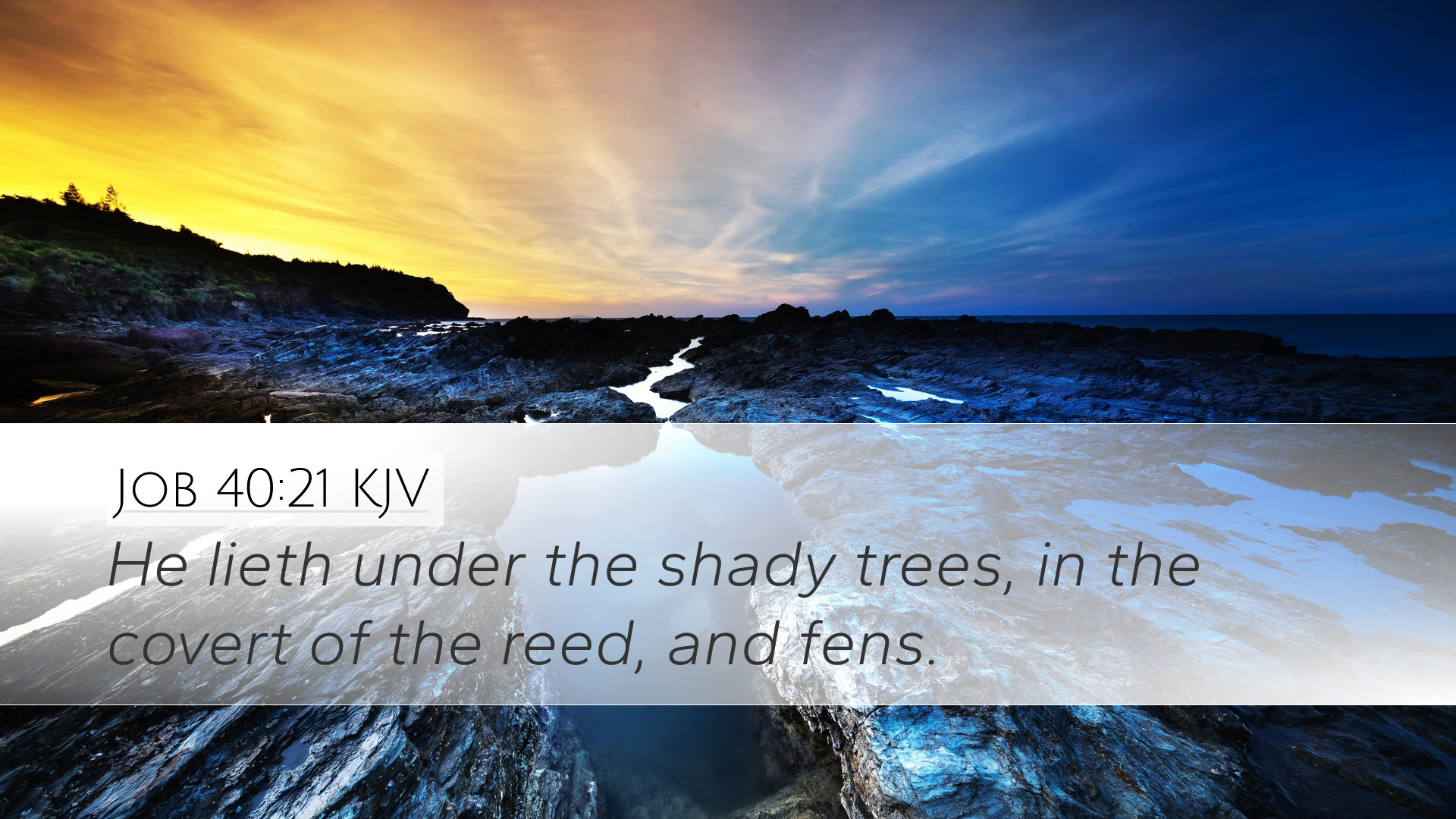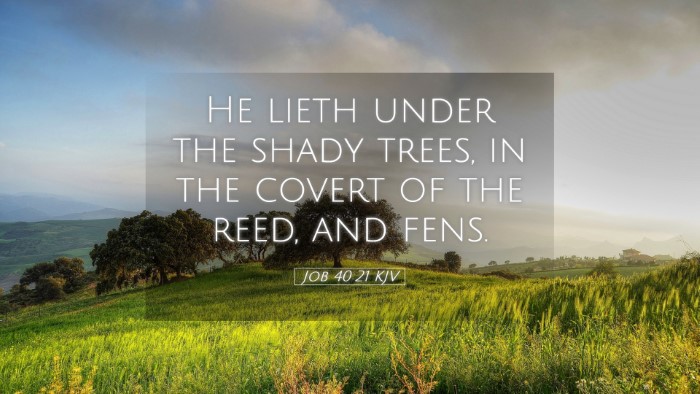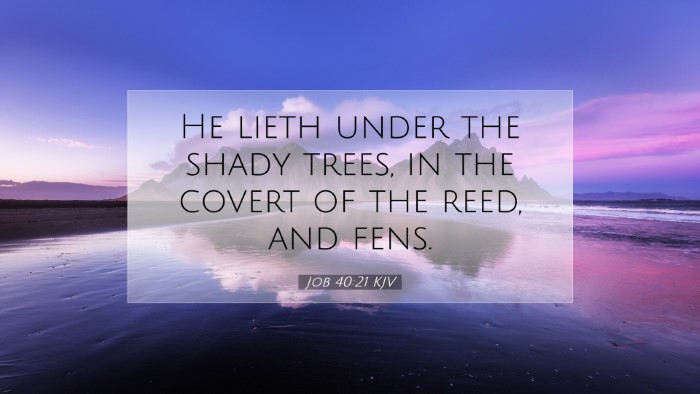Old Testament
Genesis Exodus Leviticus Numbers Deuteronomy Joshua Judges Ruth 1 Samuel 2 Samuel 1 Kings 2 Kings 1 Chronicles 2 Chronicles Ezra Nehemiah Esther Job Psalms Proverbs Ecclesiastes Song of Solomon Isaiah Jeremiah Lamentations Ezekiel Daniel Hosea Joel Amos Obadiah Jonah Micah Nahum Habakkuk Zephaniah Haggai Zechariah MalachiJob 40:21
Job 40:21 KJV
He lieth under the shady trees, in the covert of the reed, and fens.
Job 40:21 Bible Commentary
Commentary on Job 40:21
Verse Text: "He lieth under the shady trees, in the covert of the reed, and fens."
Introduction
The verse Job 40:21 serves as a vivid illustration within the grand narrative of Job's suffering and God's response to him. This verse specifically points to the magnificent creation of God, symbolized through the personification of the creature, which represents both might and humility found in nature. The teachings derived from this verse are profound and offer significant insights for pastors, students, theologians, and scholars alike.
Contextual Analysis
In the book of Job, we encounter a dialogue that primarily revolves around suffering, the nature of God, and human righteousness. The preceding chapters highlight God’s sovereignty and the limitations of human understanding. Chapter 40 marks a shift, as God begins to respond to Job's lamentations. Job 40:21 highlights a creature designed by God that requires little from humanity yet reflects divine wisdom.
Insights from Commentaries
This section compiles insights from several public domain commentaries, providing a comprehensive understanding of Job 40:21.
Matthew Henry's Commentary
Matthew Henry expounds on the imagery present in this passage. He highlights that the creature described is indicative of the majestic attributes of God’s creation. According to Henry, the creature's presence "under the shady trees" symbolizes rest and the idea that God provides for all of His creation. He elaborates that this creature, resting in the reeds, signifies a location of concealment and safety, reminding the reader of the nurturing environment God establishes for His creatures. Henry emphasizes that this passage showcases God’s power in creating and providing for the most formidable of creatures.
Albert Barnes' Commentary
Albert Barnes provides a critical analysis of the text. He suggests that the verse serves both a descriptive and metaphorical purpose. The creature, often associated with the hippopotamus or a similar large animal, illustrates strength and power within a serene and secure setting. Barnes indicates that the allusion to the "cout of the reed" signifies a quiet strength, which challenges humanity's perspective on might. The observation that such a powerful creature can be found in a peaceful, shaded context suggests that real strength does not seek to be ostentatious but finds rest in the depth of God’s design. Furthermore, Barnes highlights the importance of recognizing God’s wisdom in creating creatures that inhabit the margins of water bodies, demonstrating that even the mighty finds solace in God's plan.
Adam Clarke's Commentary
Adam Clarke provides a distinct perspective, focusing on the significance of the creature's habitat. He mentions that the description evokes a sense of tranquility and majesty intertwined. Clarke addresses the duality of the creature's existence - the blend of power and vulnerability. He compares the creature's rest under the shady trees to the believer's experience of peace in the overshadowing grace of God. This complementary relationship serves to remind the reader of God's continuous provision and the assurance found in His creation amidst chaos and suffering. Clarke emphasizes that this verse demonstrates how divine power manifests in nurturing and sustaining life rather than mere dominance.
Theological Implications
Considering the insights from various scholars, Job 40:21 opens the door for deep theological reflection on God's nature as both creator and sustainer. The portrayal of the creature resting under the shade illuminates several theological principles:
- God's Sovereignty: The verse serves as a reminder that God's control extends to all aspects of creation, including those we may not understand.
- Divine Providence: The nurturing environment of shady trees and water signifies God’s provision for both great and small creatures, implicating His care over all of creation.
- Rest and Security in God: Just as the creature finds rest in its habitat, believers are called to find peace and security in God's presence, especially amid suffering.
- The Beauty of Creation: The description of the landscape evokes an appreciation for the complexity and beauty of God’s creation, which can often be overlooked in the midst of human strife.
Practical Applications for Contemporary Readers
The lessons from Job 40:21 are not merely historical or theological, but they also bear significant relevance for contemporary believers and leaders:
- Encouragement to Lean Into God's Provision: As pastors and leaders, there is encouragement to remind congregations of God's providence. Just as the creature finds rest, so too can believers turn to God in trust and faith.
- Awareness of Nature's Role in Spiritual Life: The natural world offers a metaphor for spiritual health. It calls believers to create spaces of rest and reflection, mirroring God's design for His creatures.
- Encouragement in Times of Suffering: This verse encourages readers to recognize that even amid life's trials, God’s creation offers hope and shows His sustaining power.
- Gratitude for Creation: Acknowledging the beauty of God's creation, leaders are called to promote a sense of stewardship and gratitude, fostering a deeper appreciation for the world God has made.
Conclusion
Job 40:21 serves as a powerful reminder of God's majesty manifested in His creation. The reflections from various commentaries provide extensive insights into the nature of God, the experience of rest, and the attributes of divine providence. For pastors, theologians, and students, this verse invites deep contemplation on the interplay between God’s power and gentleness, prompting a call to trust in His sovereign care while acknowledging the immense beauty of the world He has crafted. Ultimately, as we engage with this text, may we find the assurance and peace that the creature finds hiding under the shady trees, knowing that our Creator holds all things in His hand.


